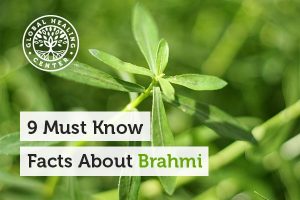
Bacopa monnieri, a plant commonly used in Ayurvedic medicine, has an age-old reputation for being an effective and powerful herb helpful for memory and combating stress. Bacopa monnieri, known to most as Brahmi, acts as an adaptogen; which means it helps the body adapt to new or stressful situations. The following 9 facts show the power and versatility of this therapeutic plant.
9 Facts About Brahmi (Bacopa monnieri)
1. Supports the Brain
As people age, it's common for age-related brain degradation to happen. The active compounds in Brahmi, known as bacosides, are beginning to be evaluated for their effects on the brain and human health. Some research has shown the compounds in Brahmi to positively influence brain cells that prompt the regeneration of brain tissue. [1] In one animal study, long-term supplementation with bacosides showed therapeutic value against the rapid degeneration associated with Alzheimer’s disease. [2] Hopefully more will continue to explore its potential benefits for brain health.
2. Promotes Liver Health
The brain is not the only organ that benefits from Brahmi's health-promoting compounds. The liver is the body's main detoxifying organ, and studies suggest Brahmi may be useful for encouraging liver function following toxin damage. [3] With the daily onslaught of toxins in our environment and food, it's no wonder so many seek safe, natural compounds that support proper liver function.
3. Protection Against Neonatal Hypoglycemia
When it comes to newborn infants, low blood sugar (hypoglycemia) can result in serious and immediate brain damage, inducing future motor and cognitive impairment. Studies have found bacosides to be highly-active compounds that exhibit neuron-protecting effects in hypoglycemic infants. Therefore, many researchers believe that Brahmi extracts may be effective for protecting newborn brains against hypoglycemia-induced brain damage. [4]
4. Positively Impacts Opioid Dependence
Doctors prescribe (and sometimes over-prescribe) opioids, like morphine and oxycodone, for pain management. Although these drugs are effective, their highly-addictive nature is a massive downside. Seventy-seven percent of chronic pain patients also suffer from depression and face an added risk of addiction. Researchers have discovered that bacosides may be helpful for enhancing the benefits of morphine while reducing the “high”, thus decreasing the risk for dependence. [5] [6] In addition, studies indicate that bacosides offer protective benefits for organs commonly affected by opiate toxicity. [7]
5. Fights Systemic Redness and Swelling
Any illness or irritation can cause redness and swelling in the body. No location more dangerous than the brain. Brahmi may be helpful at fighting this. Research supports its use for managing systemic redness in the brain caused by the body’s autoimmune response . [8] Much of the research is ongoing; however, the emerging data offers hope for new therapies in the treatment of chronic discomfort and redness.
6. Encourages Normal Blood Pressure
Brahmi has been shown to increase the utilization of nitric oxide in the body and also appears to encourage vascular muscle function, two benefits that positively influence normal blood pressure. [9] While promoting normal blood pressure is not one of Brahmi's most well-known uses, the herb may still provide a valuable, natural approach to those seeking this benefit.
7. Strong Antioxidant Activity
Antioxidants... can we get too many of them? Many researchers are evaluating natural plants, herbs, and foods for their antioxidant potential and findings indicate that Brahmi is a good one. It provides protection against oxidative damage, a type of cellular damage caused by free radicals. [10] The herb has also been shown to enhance antioxidant activity in other organs, like the kidneys. [11]
8. Organic is Best...
As with any plant or herb, it's a good idea to know its source in order to decrease the likelihood of consuming pesticides, GMO's, and pollutants. If Brahmi has a caveat, it's that it's very absorbent and can easily accumulate pollutants and other contaminants, such as arsenic, if grown in or around contaminated areas. In more than one case, Brahmi samples taken from a semi-urban area contained noticeable levels of lead, copper, cadmium, and zinc which exceeded safe thresholds. [12] [13] Conclusion? Only purchase organic or wild crafted Brahmi!
9. ...And so is Fresh!
When cooking with herbs, fresh herbs offer substantial taste benefits. It turns out that the same is true for your health; as researchers have determined that fresh Brahmi is more potent in its healthy compounds. [14]
Supplementing with Brahmi
References (14)
- Singh RH, Narsimhamurthy K, Singh G. Neuronutrient impact of Ayurvedic Rasayana therapy in brain aging. Biogerontology. 2008 Dec;9(6):369-74. doi: 10.1007/s10522-008-9185-z.
- Rastogi M, Ojha RP, Prabu PC, Devi BP, Agrawal A, Dubey GP. Prevention of age-associated neurodegeneration and promotion of healthy brain ageing in female Wistar rats by long term use of bacosides. Biogerontology. 2012 Apr;13(2):183-95. doi: 10.1007/s10522-011-9367-y.
- Menon BR, Rathi MA, Thirumoorthi L, Gopalakrishnan VK. Potential Effect of Bacopa monnieri on Nitrobenzene Induced Liver Damage in Rats. Indian J Clin Biochem. 2010 Oct;25(4):401-4. doi: 10.1007/s12291-010-0048-4.
- Thomas RB, Joy S, Ajayan MS, Paulose CS. Neuroprotective potential of Bacopa monnieri and Bacoside A against dopamine receptor dysfunction in the cerebral cortex of neonatal hypoglycaemic rats. Cell Mol Neurobiol. 2013 Nov;33(8):1065-74. doi: 10.1007/s10571-013-9973-0.
- Rauf K, Subhan F, Sewell RD. A Bacoside containing Bacopa monnieri extract reduces both morphine hyperactivity plus the elevated striatal dopamine and serotonin turnover. Phytother Res. 2012 May;26(5):758-63. doi: 10.1002/ptr.3631. Epub 2011 Nov 22.
- Rauf K, Subhan F, Abbas M, Badshah A, Ullah I, Ullah S. Effect of Bacopasides on acquisition and expression of morphine tolerance. Phytomedicine. 2011 Jul 15;18(10):836-42. doi: 10.1016/j.phymed.2011.01.023.
- Rauf K, Subhan F, Al-Othman AM, Khan I, Zarrelli A, Shah MR. Preclinical profile of bacopasides from Bacopa monnieri (BM) as an emerging class of therapeutics for management of chronic pains. Curr Med Chem. 2013;20(8):1028-37.
- Williams R, Münch G, Gyengesi E, Bennett L. Bacopamonnieri (L.) exerts anti-inflammatory effects on cells of the innate immune system in vitro. Food Funct. 2014 Jan 22.
- Kamkaew N, Scholfield CN, Ingkaninan K, Maneesai P, Parkington HC, Tare M, Chootip K. Bacopa monnieri and its constituents is hypotensive in anaesthetized rats and vasodilator in various artery types. J Ethnopharmacol. 2011 Sep 1;137(1):790-5. doi: 10.1016/j.jep.2011.06.045
- Shinomol GK, Muralidhara. Bacopa monnieri modulates endogenous cytoplasmic and mitochondrial oxidative markers in prepubertal mice brain. Phytomedicine. 2011 Feb 15;18(4):317-26. doi: 10.1016/j.phymed.2010.08.005.
- Kapoor R, Srivastava S, Kakkar P. Bacopa monnieri modulates antioxidant responses in brain and kidney of diabetic rats. Environ Toxicol Pharmacol. 2009 Jan;27(1):62-9. doi: 10.1016/j.etap.2008.08.007.
- Srikanth Lavu RV, Prasad MN, Pratti VL, Meißner R, Rinklebe J, Van De Wiele T, Tack F, Du Laing G. Trace metals accumulation in Bacopa monnieri and their bioaccessibility. Planta Med. 2013 Aug;79(12):1081-3. doi: 10.1055/s-0032-1328713.
- Kulhari A1, Sheorayan A1, Bajar S2, Sarkar S3, Chaudhury A1, Kalia RK1. Investigation of heavy metals in frequently utilized medicinal plants collected from environmentally diverse locations of north western India. Springerplus. 2013 Dec 17;2:676. doi: 10.1186/2193-1801-2-676.
- Srivastava P, Raut HN, Puntambekar HM, Desai AC. Stability studies of crude plant material of Bacopa monnieri and quantitative determination of bacopaside I and bacoside A by HPLC. Phytochem Anal. 2012 Sep-Oct;23(5):502-7. doi: 10.1002/pca.2347.
†Results may vary. Information and statements made are for education purposes and are not intended to replace the advice of your doctor. If you have a severe medical condition or health concern, see your physician.







